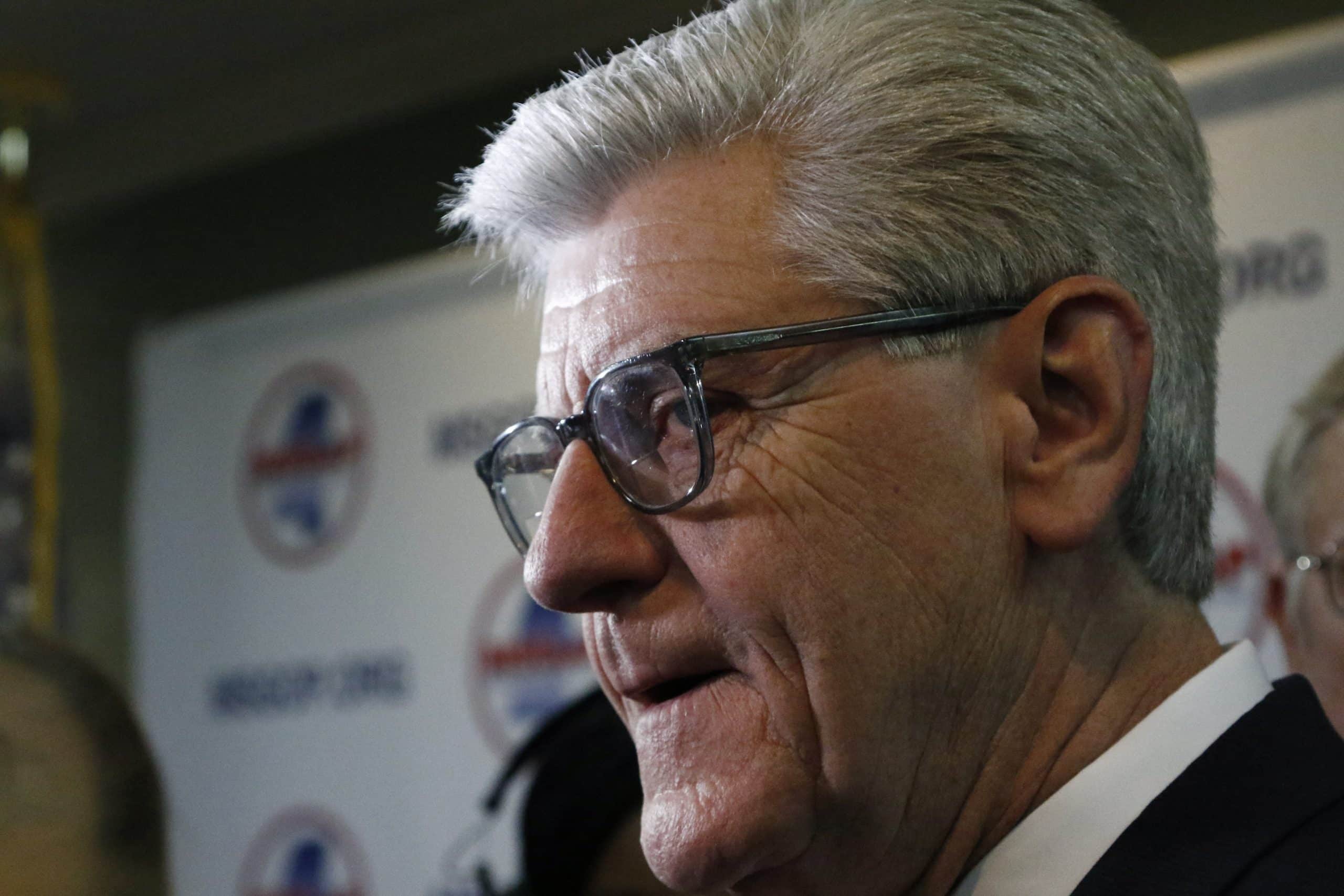Mississippi Today
Court filing alleges Gov. Phil Bryant directed welfare funds for illegal volleyball and concussion drug projects

For the first time in a court filing, a key defendant in the Mississippi welfare scandal is alleging that former Gov. Phil Bryant was behind the use of welfare agency grant funds for two projects now deemed illegal.
The nonprofit founded by Nancy New, one of the central figures of the scheme, is alleging that Bryant was involved in directing welfare funds towards the construction of a volleyball stadium and a pharmaceutical startup company — two projects former NFL quarterback Brett Favre lobbied officials to support. Favre has also alleged that Bryant supported the nonprofit's payments to the two ventures.
“Based on the foregoing, as well as evidence that will be presented at trial, Bryant was involved, both directly and indirectly, in directing, approving, facilitating, and/or furthering MDHS's use of federal grant funds for Prevacus and for construction of the USM volleyball center,” reads a Dec. 12 court filing by Mississippi Community Education Center's attorney Gerry Bufkin.
Bryant has previously denied involvement in the use of welfare funds for either project. Through his attorney, Bryant declined to answer questions about the allegations made in the Dec. 12 filing. Bryant, who is suing Mississippi Today for defamation, has sent threats to the news outlet for continuing to report this story, including basic updates about public court documents.
The court filing also details how at least some of the welfare money sent to the concussion drug company Prevacus may have actually ended up in the hands of scammers in Ghana.
READ MORE: Mississippi welfare funds wound up in a Ghanaian gold bar hoax, court filing alleges
New is one of eight criminal defendants and 47 civil defendants that Mississippi Department of Human Services is suing in an attempt to recoup $77 million in stolen or misspent federal funds.
Last year, New alleged in a filing that Bryant instructed her to make a $1.1 million payment directly to Favre, but this is the first time she or her nonprofit have alleged Bryant was behind payments to the other Favre projects.
Mississippi Community Education Center's 81-page answer to the complaint, filed Dec. 12, alleges that Bryant conferred with then-agency director John Davis to channel agency grant funds towards the projects, but that the state has purposefully left the former governor out of the lawsuit. The filing also argues that the welfare department has been exploiting flexibility in federal law around state spending since the inception of the Temporary Assistance for Needy Families program in 1996.
“By omitting Bryant, and by attempting to disavow Davis, MDHS seeks to distance itself from its 25-year course of performance in relation to TANF and other grant expenditures,” the filing reads.
This is a similar argument to those made by other defendants such as Favre, fitness trainer Paul Lacoste and the nephew of the former welfare director.
The timeline
The latest court filing contains a lengthy timeline of Bryant's alleged involvement in the Favre projects using texts and documents, most of which have been previously produced in court or published by Mississippi Today.
The relevant messages include texts New has produced between herself and Favre and Bryant; texts Bryant produced between himself and Favre; texts Vanlandingham produced between himself, Bryant and Favre and other associates.
The texts contain gaps that defendant testimony — which has not yet been gathered — may fill. Mississippi Community Education Center's latest filing contains references to records and unspecified “evidence that will be presented at trial” to back up its claims against the former governor.
The following is an abbreviated timeline of the events as described in the court document. It reflects only Mississippi Community Education Center's side of the story, and Bryant is not a defendant in the case.
Nov. 1, 1996: Phil Bryant became Mississippi's State Auditor, the same year Congress passed the Personal Responsibility and Work Opportunity Reconciliation Act, which replaced the former entitlement cash welfare program with the Temporary Assistance for Needy Families block grant.
Jan. 11, 2016: Elected governor four years earlier, Bryant appointed John Davis as the director of the Mississippi Department of Human Services.
April 20, 2017: Favre first texted Bryant to say that he was working to build a volleyball facility on University of Southern Mississippi's campus, and “I need your influence somehow to get donations and or sponsorships.”
July 2017: Favre again asked for the governor's help, texting, “you are the governor and on our side and that's a good thing.” The governor communicated with Davis, the filing alleges. Davis then met with Favre, New and others at USM, where Davis committed $4 million to the project.
August 2017: USM would not immediately accept the funds. Favre contacted Bryant for help, the filing alleges, then Bryant contacted New. New texted Favre, “Wow, just got off phone with Phil Bryant! He is on board with us! We will get this done!” Days later, USM accepted the grant funds after someone arranged a deal that the university could take $1 million of it for its own improvement projects.
September 2017: Worried about a funding shortfall for the volleyball facility, Favre again contacted the governor, the court filing alleges “based on information and belief.” “I saw the Governor last night,” New texted Favre. “It's all going to work out.” Soon after, the filing alleges, the welfare agency increased its commitment from $4 million to $5 million.
May 2018: Construction again faced a funding shortfall. Favre reached out to Bryant, texts show. One week later, the project received additional funding. “Good News. I have a little money for the ‘project' – $500,000!” New texted Favre.
October-December 2018: Favre and Vanlandingham, the Prevacus founder, had been in talks with a Mississippi-based investor group, but the deal fell through after the group asked for 95% shares in the company, with no cash investment, solely for them to use their “political clout” to secure FDA approval. So they reached out to Bryant. They offered him stock in the company. All three, in addition to others, met for dinner at Walker's Drive-In to discuss opportunities for the company. Mississippi Today has reported on this meeting and the text exchanges surrounding it.
January-June 2019: Days after the Walker's meeting, welfare officials met at Favre's house and agreed on a $1.7 million grant for Prevacus. Vanlandingham texted the governor to express his excitement about working with his welfare officials. “1.95M with the Governors help,” Vanlandingham texted another Mississippi official and potential investor, according to the court filing. New began sending payments to Prevacus and Favre informed the governor of the cash flow. Vanlandingham, Favre and Bryant texted continually about Prevacus business developments. Read more in Mississippi Today's series “The Backchannel.”
June 11, 2019: Vanlandingham met Gov. Tate Reeves, then a candidate for governor, in New Orleans. Discussing the meeting with other Prevacus board members, Vanlandingham said, “I'm meeting the governor and who he's supporting to take his place in Mississippi. Hoping to keep that non-dilute running our way!!!” Read more in Mississippi Today's October article.
June 21, 2019: Bryant received a tip about Davis allegedly committing fraud, which he turned over to State Auditor Shad White, effectively forcing Davis out of office.
July 2, 2019: Bryant met with New, the court filing alleges. “MDHS owed reimbursements to MCEC and New told Bryant she could no longer fund Prevacus and volleyball without the reimbursements,” the filing reads.
July 12, 2019: New texted Vanlandingham, “we can send 400k today [but] I will need to let Brett know that we will need to pull this from what we were hoping to help him with [volleyball]….” (MDHS's civil complaint says the money was delivered on July 16, 2019.)
July 16, 2019: New texted Favre, “I may not be able to assist you in Aug. as we had planned.” Favre responded, “About to see Governor Bryant.” Favre, on his way to see the governor, texted Bryant, “I really need your help with Nancy and Jake.” Bryant responded, “You my man… we are all in….” After seeing Favre, Bryant texted New, “Just left Brett Favre. Can we help him with his project. We should meet soon to see how I can make sure we keep your projects on course.”
July 22, 2019: New submitted a grant proposal to MDHS for $2 million in additional funds to finish construction on the volleyball stadium.
August 8, 2019: Bryant texted New, “Meeting with Brett in a few. Have the proposal and working it through DHS.” Bryant and Favre met. Favre texted New that they had met about something else, and “he only had 15 minutes but he did say at the end that he will get this done with you!!!”
August-November 2019: Bryant, Favre and New worked together to try to usher the volleyball proposal through MDHS, the court filing alleges. “Bryant, using Favre as intermediary, told New how to revise the grant proposal to ‘get it accepted,'” the filing alleges. Favre texted New, “He said to me just a second ago that he has seen it but hint hint that you need to reword it to get it accepted.” Bryant secured a meeting for New and Favre with then-director Christopher Freeze to discuss the proposal. Later on, Bryant told Freeze he supported the project. Read more here.
December 2019: After a meeting between Bryant and New, the court filing alleges, the welfare agency awarded New's nonprofit three new grants totaling $8.6 million. Bryant texts New, “Did y'all get any Of the new programs from DHS?” New responded, “Yes, we did … Someone was definitely pulling for us behind the scenes. Thank you,” to which Bryant responded with a smiley face emoji.
January 2020: Favre and Vanlandingham discussed offering Bryant a package – either stock or cash – ”that will get him determined to see [Prevacus] through.” After Bryant left office on Jan. 15, 2020, Vanlandingham texted Bryant the next day, “Now that you're unemployed I'd like to give you a company package for all your help … we want you on our team!!!” Bryant responded, “Sounds good. Where would be the best place to meet.”
Feb. 5, 2020: John Davis, Nancy New and four others “were arrested for spending grant funds as directed, approved, facilitated, and/or furthered by MDHS, including, without limitation, the MDHS Executives, Bryant, and Davis,” the filing reads.
This article first appeared on Mississippi Today and is republished here under a Creative Commons license.
Mississippi Today
On this day in 1896


MAY 18, 1896

The U.S. Supreme Court ruled 7-1 in Plessy v. Ferguson that racial segregation on railroads or similar public places was constitutional, forging the “separate but equal” doctrine that remained in place until 1954.
In his dissent that would foreshadow the ruling six decades later in Brown v. Board of Education, Justice John Marshall Harlan wrote that “separate but equal” rail cars were aimed at discriminating against Black Americans.
“In the view of the Constitution, in the eye of the law, there is in this country no superior, dominant, ruling class of citizens,” he wrote. “Our Constitution in color-blind and neither knows nor tolerates classes among citizens. In respect of civil rights, all citizens are equal before the law. The humblest is the peer of the most powerful. The law … takes no account of his surroundings or of his color when his civil rights as guaranteed by the supreme law of the land are involved.”
This article first appeared on Mississippi Today and is republished here under a Creative Commons license.
Did you miss our previous article…
https://www.biloxinewsevents.com/?p=359301
Mississippi Today
Renada Stovall, chemist and entrepreneur
Renada Stovall sat on the back deck of her rural Arkansas home one evening, contemplating life when she had a life-altering epiphany…
“I gotta get out of these woods.”
She heard it as clear as lips to her ear and as deep as the trees surrounding her property. Stovall's job as a chemist had taken her all over the country. In addition to Arkansas, there were stints in Atlanta, Dallas and Reno. But she was missing home, her parents and friends. She also knew, she needed something else to do.
“I thought, what kind of business can I start for myself,” said Stovall, as she watered herbs growing in a garden behind her south Jackson home. Some of those herbs are used in her all-natural products. “I know when I lived in Reno, Nevada, where it's very hot and very dry, there really weren't products available that worked for me, my hair, and my skin suffered. I've got a chemistry degree from Spelman College. I took the plunge and decided to create products for myself.”

In 2018, Stovall's venture led to the creation of shea butter moisturizers and natural soaps. But she didn't stop there, and in December 2022, she moved home to Mississippi and got to work, expanding her product line to include body balms and butters, and shampoos infused with avocado and palm, mango butter, coconut and olive oils.
Nadabutter, which incorporates Renada's name, came to fruition.

Stovall sells her balms and moisturizers at what she calls, “pop-up markets,” across the state during the summer. She's available via social media and also creates products depending on what of her ingredients a customer chooses. “My turmeric and honey is really popular,” Stovall added.
“The all-natural ingredients I use are great for conditioning the skin and hair. All of my products make you feel soft and luscious. The shea butter I use comes from West Africa. It's my way of networking and supporting other women. And it's my wish that other women can be inspired to be self-sufficient in starting their own businesses.”





This article first appeared on Mississippi Today and is republished here under a Creative Commons license.
Mississippi Today
On this day in 1954
MAY 17, 1954

In Brown v. Board of Education and Bolling v. Sharpe, the U.S. Supreme Court unanimously ruled that the “separate but equal” doctrine in Plessy v. Ferguson was unconstitutional under the 14th Amendment, which guaranteed equal treatment under the law.
The historic decision brought an end to federal tolerance of racial segregation, ruling in the case of student Linda Brown, who was denied admission to her local elementary school in Topeka, Kansas, because of the color of her skin.
In Mississippi, segregationist leaders called the day “Black Monday” and took up the charge of the just-created white Citizens' Council to preserve racial segregation at all costs.
This article first appeared on Mississippi Today and is republished here under a Creative Commons license.
-
SuperTalk FM6 days ago
Martin Lawrence making 3 stops in Mississippi on comedy tour
-
Our Mississippi Home5 days ago
Beat the Heat with Mississippi’s Best Waterparks
-
SuperTalk FM2 days ago
State auditor cracking down on Mississippians receiving unemployment benefits
-
Our Mississippi Home6 days ago
Charlie’s U-Pik: Opening Soon for the Summer Season
-
Mississippi News Video4 days ago
Jackson has a gang problem
-
Kaiser Health News5 days ago
Medicaid ‘Unwinding’ Decried as Biased Against Disabled People
-
Local News1 day ago
Family files lawsuit after teen’s suicide in Harrison County Jail
-
Mississippi Today3 days ago
On this day in 1950









































